Quick Links
Introduction
It is our pleasure to invite you to read our department research newsletter. Here we share the exciting research achievements and contributions of our colleagues over the past year, whether they be research students, current members of staff or honorary members. This year has been particularly special for us, with our excellent results in the Research Excellence Framework (REF): we were placed 4th in the UK for research power in economics and econometrics.
This newsletter shows exactly how our vibrant research culture has led us to these heights. Here you will read about the ambitious and topical research questions of our PhD students, the creative, influential and award-winning papers published by our colleagues and their many research grant successes. The sheer depth and breadth of research done in our department is a matter of pride for us, and we are equally proud to share this with you.
You will find members of the department crisscrossing the globe, not only invited to talk about their own research by the best institutions of many countries but also learning about developments in their fields at top international conferences. We can be found in large numbers at the most prestigious events, ensuring that our work is talked about wherever serious economics research is conducted. But we don’t just go places, you will also find us bringing the world to Essex in the form of top class international workshops featuring high quality and diverse speakers. It is this engagement and drive that makes our research environment so special, in fact recognized by being ranked 3rd in the UK in the REF.
We hope you enjoy reading about our work just as much as we enjoy producing it.
Our Academic Staff
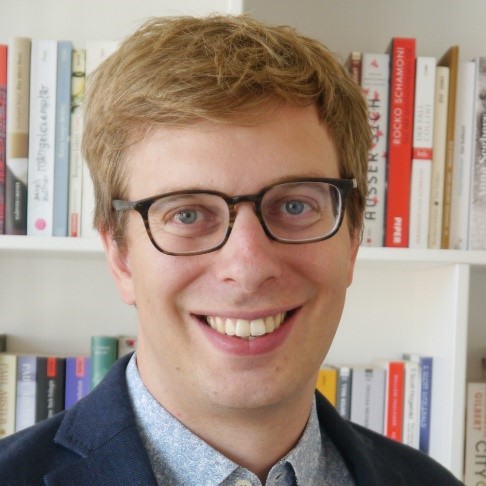 In the past academic year, my paper ‘General Equilibrium with Multiple Liquid Assets’, which I wrote jointly with Kohei Iwasaki and Randall Wright, was accepted for publication in the Review of Economic Dynamics. In this paper, we show how the liquidity of money, capital, and equity interact with each other and how taking this interaction seriously leads to novel results regarding financial stability, monetary policy transmission, and the welfare cost of inflation.
In the past academic year, my paper ‘General Equilibrium with Multiple Liquid Assets’, which I wrote jointly with Kohei Iwasaki and Randall Wright, was accepted for publication in the Review of Economic Dynamics. In this paper, we show how the liquidity of money, capital, and equity interact with each other and how taking this interaction seriously leads to novel results regarding financial stability, monetary policy transmission, and the welfare cost of inflation.
Besides this, I have completed two papers on banking – one about bank runs, the other about oligopolistic banking competition – which are now in the journal review process. I have also started working on several new projects. In one of them, we study under which conditions e-monies such as Bitcoin may be valued and what their existence implies for monetary policy and financial stability; in another, we investigate the distributional impacts of bank bailouts and other measures to stabilise banks - I.e., whether it is true that such policies primarily “bail out the rich”.
 I am excited to have joined the University of Essex this summer following the completion of my PhD at the London School of Economics. My paper ‘Smart Contracts and the Coase Conjecture’, co-authored with Alkis Georgiadis-Harris and Balázs Szentes, was recently published in the American Economic Review. The paper revisits the classic problem of the sale of a durable good by a monopolist who cannot make intertemporal commitments. The famous Coase conjecture stipulates that, when opportunities to revise her price are frequent, the seller must abandon her monopoly power and clear the market quickly, at a price close to the lowest willingness-to-pay. Motivated by smart contracts used in digital markets, our analysis explores whether this conclusion is robust to allowing the seller to use more complex selling mechanisms. The main result of the paper demonstrates that, with a sufficiently rich contract space, the seller's largest equilibrium profits can be bounded away from the lowest willingness-to-pay, enabling the monopolist to extract rent despite her inability to commit to long-term contracts.
I am excited to have joined the University of Essex this summer following the completion of my PhD at the London School of Economics. My paper ‘Smart Contracts and the Coase Conjecture’, co-authored with Alkis Georgiadis-Harris and Balázs Szentes, was recently published in the American Economic Review. The paper revisits the classic problem of the sale of a durable good by a monopolist who cannot make intertemporal commitments. The famous Coase conjecture stipulates that, when opportunities to revise her price are frequent, the seller must abandon her monopoly power and clear the market quickly, at a price close to the lowest willingness-to-pay. Motivated by smart contracts used in digital markets, our analysis explores whether this conclusion is robust to allowing the seller to use more complex selling mechanisms. The main result of the paper demonstrates that, with a sufficiently rich contract space, the seller's largest equilibrium profits can be bounded away from the lowest willingness-to-pay, enabling the monopolist to extract rent despite her inability to commit to long-term contracts.
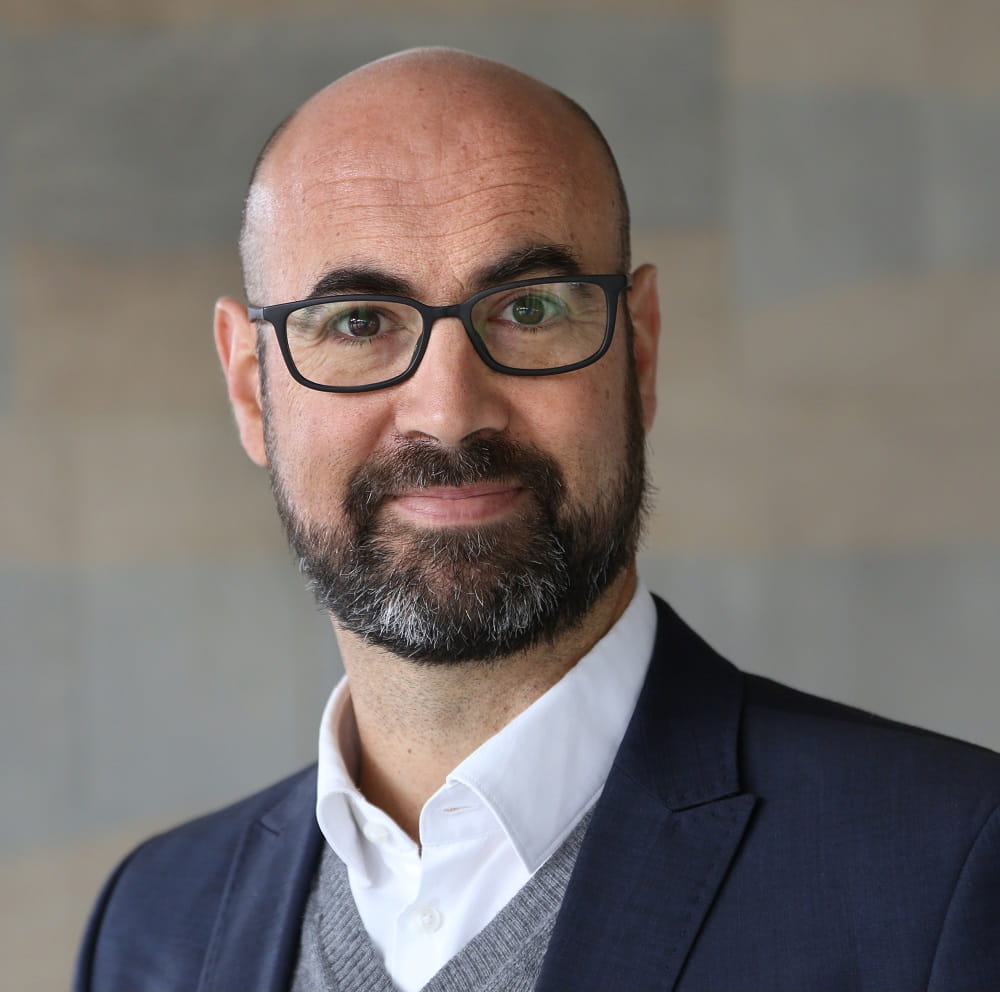 Professor Carlos Carrillo-Tudela has published three new journal articles in Econometrica, Journal of the European Economics Association and Labour Economics. His current work on “Sectoral Labour Flows” has generated a large impact among policymakers. This work has been used as evidence for the Low Pay Commission Report 2022, the House of Lords Economic Affairs Committee’s inquiry into the UK Labour Supply in February 2023, the Structural Economic Division of the Bank of England’s report to the Monetary Policy Committee in August 2023 and included in the Low Pay Commission Research Symposium, September 2023, that provides recommendations to government ministers for determining the new minimum wage levels.
Professor Carlos Carrillo-Tudela has published three new journal articles in Econometrica, Journal of the European Economics Association and Labour Economics. His current work on “Sectoral Labour Flows” has generated a large impact among policymakers. This work has been used as evidence for the Low Pay Commission Report 2022, the House of Lords Economic Affairs Committee’s inquiry into the UK Labour Supply in February 2023, the Structural Economic Division of the Bank of England’s report to the Monetary Policy Committee in August 2023 and included in the Low Pay Commission Research Symposium, September 2023, that provides recommendations to government ministers for determining the new minimum wage levels.
 With co-authors from Yale, KCL, and Amsterdam, I finished a study in which we use 40 years of data from the American TV Game show “the Price is Right” to investigate people’s degree of strategic reasoning. Investigating behaviour in a simple sequential game that is played in the show, we find that people deviate strongly from the (rational) economic prediction. Further inspections shows that these deviations can be explained by bounded rationality: people simplify the decision problem by adopting a myopic representation and only think one step ahead. I presented these findings at conferences organized by the Economic Science Association and the European Economic Association over the last months.
With co-authors from Yale, KCL, and Amsterdam, I finished a study in which we use 40 years of data from the American TV Game show “the Price is Right” to investigate people’s degree of strategic reasoning. Investigating behaviour in a simple sequential game that is played in the show, we find that people deviate strongly from the (rational) economic prediction. Further inspections shows that these deviations can be explained by bounded rationality: people simplify the decision problem by adopting a myopic representation and only think one step ahead. I presented these findings at conferences organized by the Economic Science Association and the European Economic Association over the last months.
I published two studies last year. In the first, I used data from a Dutch TV show to study gender differences in competitiveness. In the second, I used data from four different sports and showed that a seminal result in the literature, namely that being behind during a sports match may actually increase the chance of winning, does not replicate.
In the fall, I will open a new Research Centre at the University of Essex: the Essex Centre for Behavioural Science. The new Centre aims to be a strong and visible research cluster in behavioural science at the University and bring together researchers from across departments.
 This past academic year, I gave talks on the design of on-line markets at Airbnb headquarters and in a webinar organized by Dongbei University in northern China. I also gave a webinar for the Learning, Evolution & Games group on self-enforcing cycles in large games, and published a coauthored paper in Management Science on the inclusion premium for stocks that become part of an index fund.
This past academic year, I gave talks on the design of on-line markets at Airbnb headquarters and in a webinar organized by Dongbei University in northern China. I also gave a webinar for the Learning, Evolution & Games group on self-enforcing cycles in large games, and published a coauthored paper in Management Science on the inclusion premium for stocks that become part of an index fund.
Besides advancing two ongoing projects with Essex colleagues, this year I completed a paper, now under journal review but already summarized in Columbia University and Oxford University Law School blogs. The paper, ‘Trade, Voting, and ESG policies: Theory and Evidence’ with John Duffy, Jean Paul Rabanal and Olga Rud, considers policies that benefit society but are costly to shareholders, e.g., proposals to reduce their carbon footprints, diversify their workplaces, or better protect customers’ private information. Typically some shareholders would favor such a policy while others would oppose it. We build a formal model in which investors first trade shares in the firm and then the final shareholders vote the policy up or down. We test the predictions of the model in a laboratory experiment which largely confirms those predictions, with the exception that share prices reflect surprisingly little of the cost in circumstances when the policy is approved. An implication is that existing shareholders may bear less of the cost of ESG policies than one might suppose.
 I have a had a busy year of research with some new publications and interesting conferences, workshops and invited seminars. I recently published articles in Econometrica and Econometric Theory as well as a personal favourite: a project testing urban economics models with archaeological data from ancient Greece that appeared in the Journal of Urban Economics. All these articles involved international collaborations as wide from South Korea, China and the US. I have also started a number of new projects that I am very excited about, again with co-authors across the globe. Over the last year I also had the privilege of travelling to Lima for the Latin American Econometric Society meeting, which was a superb scientific event with the added bonus of some of the world’s best gastronomical offerings in the Peruvian capital. I also presented my research at conferences and seminars in the US, France, Romania and Denmark.
I have a had a busy year of research with some new publications and interesting conferences, workshops and invited seminars. I recently published articles in Econometrica and Econometric Theory as well as a personal favourite: a project testing urban economics models with archaeological data from ancient Greece that appeared in the Journal of Urban Economics. All these articles involved international collaborations as wide from South Korea, China and the US. I have also started a number of new projects that I am very excited about, again with co-authors across the globe. Over the last year I also had the privilege of travelling to Lima for the Latin American Econometric Society meeting, which was a superb scientific event with the added bonus of some of the world’s best gastronomical offerings in the Peruvian capital. I also presented my research at conferences and seminars in the US, France, Romania and Denmark.
 Tim Hatton has been working on emigration from the UK to the United States, Canada and Australia in the late nineteenth century. Much has been written about the economic gains to the migrants but less about the cost of the journey. One important element of the cost is foregone earnings while on the voyage. By combining data on dates of departure and arrival, Tim has provided new measures of the length of emigrant voyages. They show that voyages from Liverpool to New York fell from 40 days in the early 1850s to 8 days in 1913, largely due to the transition from sailing ships to steamships. Over the same six decades the voyage to Australia fell from 105 to 46 days. Tim finds that voyage durations influenced the flow of migration and is now studying the policies of assisted migration that were designed to encourage migrants to go to Australia.
Tim Hatton has been working on emigration from the UK to the United States, Canada and Australia in the late nineteenth century. Much has been written about the economic gains to the migrants but less about the cost of the journey. One important element of the cost is foregone earnings while on the voyage. By combining data on dates of departure and arrival, Tim has provided new measures of the length of emigrant voyages. They show that voyages from Liverpool to New York fell from 40 days in the early 1850s to 8 days in 1913, largely due to the transition from sailing ships to steamships. Over the same six decades the voyage to Australia fell from 105 to 46 days. Tim finds that voyage durations influenced the flow of migration and is now studying the policies of assisted migration that were designed to encourage migrants to go to Australia.
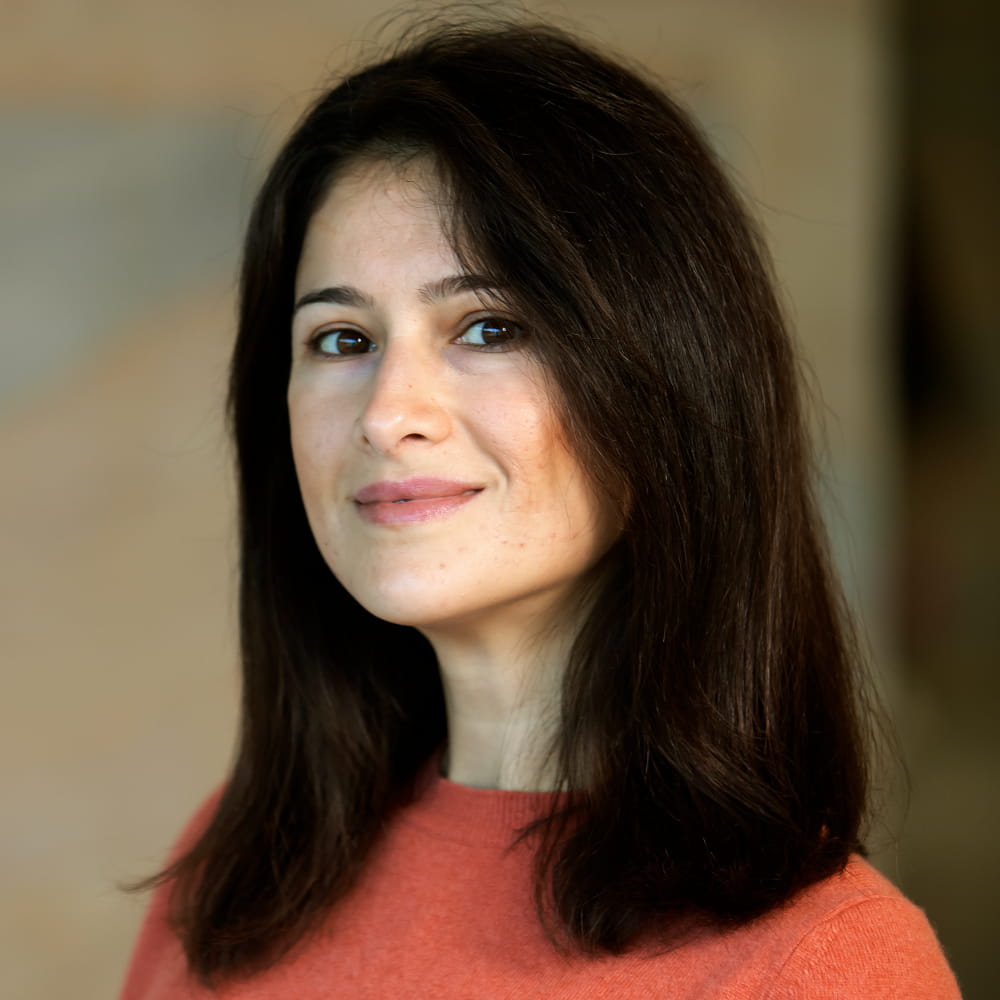 The expansion of digital financial services has been beneficial for people but it has also given rise to consumer protection issues such as fraud and scams. Detrimental effects of scams include not only monetary costs but also non-monetary costs such as erosion of trust in financial services. This raises the following question: how good are people at recognising scams? Elif Kubilay and Lisa Spantig answer this question in their recently published paper at the Journal of Development Economics (joint with Jana Cahlikova, Lucy Kaaria and Eva Raiber). Specifically, they conducted an online experiment in Kenya using real scam messages. Additionally, they tested the effectiveness of scam education, a common approach used by banks and financial institutions. The results show that scam education does not improve scam identification ability. A closer look into the results reveal that participants who receive scam education are more likely to mistake official messages as scam in comparison to the participants in the control group, suggesting over-caution.
The expansion of digital financial services has been beneficial for people but it has also given rise to consumer protection issues such as fraud and scams. Detrimental effects of scams include not only monetary costs but also non-monetary costs such as erosion of trust in financial services. This raises the following question: how good are people at recognising scams? Elif Kubilay and Lisa Spantig answer this question in their recently published paper at the Journal of Development Economics (joint with Jana Cahlikova, Lucy Kaaria and Eva Raiber). Specifically, they conducted an online experiment in Kenya using real scam messages. Additionally, they tested the effectiveness of scam education, a common approach used by banks and financial institutions. The results show that scam education does not improve scam identification ability. A closer look into the results reveal that participants who receive scam education are more likely to mistake official messages as scam in comparison to the participants in the control group, suggesting over-caution.
Sheri Markose
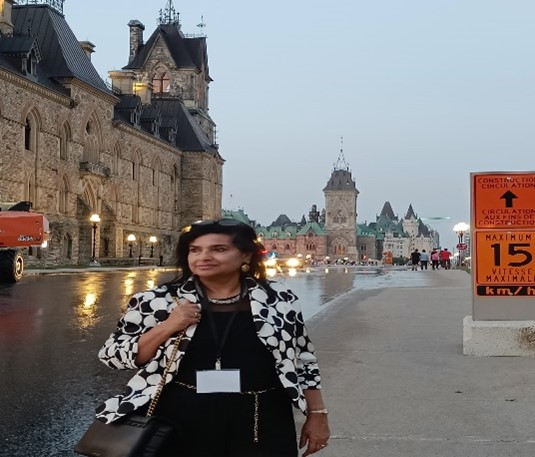 Sheri Markose was invited by the Central Bank of Canada in Ottawa to speak at their annual Workshop on Digital Payments & Securities Settlement: Data & Information in July 2023.
Sheri Markose was invited by the Central Bank of Canada in Ottawa to speak at their annual Workshop on Digital Payments & Securities Settlement: Data & Information in July 2023.
This Workshop is co-sponsored by Canada Payments and Deutsche Bundesbank.
Based on her longstanding research on payments & settlements Sheri says “Till the onset of digital payments, crypto-currencies and peer-peer electronic platforms or decentralized finance (Defi), payment infrastructure was considered to be like routine plumbing – not very interesting. The FinTech revolution has changed this, turbo charging research in this field”. Sheri met with the teams at Bank of Canada and Canada Payments to discuss potential collaboration on the development of agent-based simulation models to assess the efficacy of new digital payments media.
Sheri chaired the Roundtable on 'Defi, CBDC, AI & Bots: Challenges and Prospects of Digital Finance' in September 2023 at the joint Essex University and Centre for Global Finance Conference at SOAS
With Shiv Chowla, Senior Manager for CBDC of the Bank of England as a panelist, major focus of discussion was the BoE and Treasury White Paper on the Digital Pound.
In the last academic year Sheri has made progress on her seminal work on the digital foundations of intelligence with her publication in BioSystems on Adaptive-Cognitive Systems as unique Godelian blockchain distributed ledger and the forthcoming Special Issue on Narrow and General Intelligence in multiple Frontiers Journal on Computational Intelligence and Neuroscience. This has led to a large multidisciplinary grant application with Essex University Computer Science & Biological Sciences, UCL BioChemistry and Biological Sciences at Queen Mary College, London.
Sheri has been invited to contribute to the Chalmers Institute, Sweden, AI Centre project on ‘AI for People' by Chair Gordana Dodig-Crnkovic.
 Heading an interdisciplinary team of economists, psychologists and musicians, I published a paper demonstrating how behavioural economics can inform decisions related to music. Music-related decision-making encompasses a wide range of activities including music listening, composition and performance, as well as many applications of music including marketing, music education and therapy. For example, we discuss how voluntary payments for music downloads can be explained by social preferences, whereby consumers care about the preferences of others as well as their own, incorporating concerns for reciprocity, altruism, and fairness. As another example, we show how models of behavioural time preferences can be used to improve student motivation when learning to play a musical instrument, so that students can better understand the trade-offs between the short-term temptation of not practising vs long-term goals. This new research agenda, known as the Behavioural Economics of Music (BEM), represents a major advance in our understanding of music-decision making, and paves the way for new interdisciplinary research positioned at the intersection of economics, psychology, and music. This year I presented this work at an invited seminar at the Burgundy School of Business in Dijon and the International Conference on Music Perception and Cognition in Tokyo.
Heading an interdisciplinary team of economists, psychologists and musicians, I published a paper demonstrating how behavioural economics can inform decisions related to music. Music-related decision-making encompasses a wide range of activities including music listening, composition and performance, as well as many applications of music including marketing, music education and therapy. For example, we discuss how voluntary payments for music downloads can be explained by social preferences, whereby consumers care about the preferences of others as well as their own, incorporating concerns for reciprocity, altruism, and fairness. As another example, we show how models of behavioural time preferences can be used to improve student motivation when learning to play a musical instrument, so that students can better understand the trade-offs between the short-term temptation of not practising vs long-term goals. This new research agenda, known as the Behavioural Economics of Music (BEM), represents a major advance in our understanding of music-decision making, and paves the way for new interdisciplinary research positioned at the intersection of economics, psychology, and music. This year I presented this work at an invited seminar at the Burgundy School of Business in Dijon and the International Conference on Music Perception and Cognition in Tokyo.
 Nick recently had a paper conditionally accepted at the Journal of Human Resources. It presents evidence that recent increases in the mortality of white Americans has roots in their health as children in the 1950s and 1960s.
Nick recently had a paper conditionally accepted at the Journal of Human Resources. It presents evidence that recent increases in the mortality of white Americans has roots in their health as children in the 1950s and 1960s.
He presented a related paper at the European Economic Association Annual Meeting in Barcelona in August. This paper presents evidence of a broad decline in the health and human capital of Americans beginning with cohorts born after 1947 and continuing until at least mid-1960s cohorts.
He has been working on a project, with collaborators at the Federal Reserve Bank of Philadelphia and the University of Massuchusetts, Amherst, which uses natural language processing to “map” patents to the space of ideas and to measure the similarity of patents to each other. He has a number of other ongoing projects, for example studying the remarkable improvement in longevity for Americans born between 1890 and the 1940s.
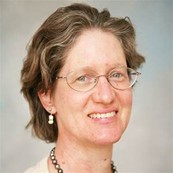 Kate has participated in several interdisciplinary initiatives this year. She has worked with Law School colleagues to submit a large research grant, spanning all three Essex faculties, on fairness in competition and consumer interactions. She worked with the Institute of Social and Economic Research and the Law School to support the evolution of energy policy in the UK via a series of meetings and workshops with OFGEM and the Department of Energy and Net Zero. Kate also submitted a bid joint with the Indian Institute of Technology and a private intellectual property consultancy to judge the effectiveness of AI in patent valuation. Kate’s two PhD students, Angelos Stenimachitis and Emmanuel Offei, continue their work on the demand for Intellectual Property Protection, joint with the UK Intellectual Property Office and the Essex Business School (Stenimachitis), and the demand for food waste platform services, joint with the Kedge Business School in France (Offei).
Kate has participated in several interdisciplinary initiatives this year. She has worked with Law School colleagues to submit a large research grant, spanning all three Essex faculties, on fairness in competition and consumer interactions. She worked with the Institute of Social and Economic Research and the Law School to support the evolution of energy policy in the UK via a series of meetings and workshops with OFGEM and the Department of Energy and Net Zero. Kate also submitted a bid joint with the Indian Institute of Technology and a private intellectual property consultancy to judge the effectiveness of AI in patent valuation. Kate’s two PhD students, Angelos Stenimachitis and Emmanuel Offei, continue their work on the demand for Intellectual Property Protection, joint with the UK Intellectual Property Office and the Essex Business School (Stenimachitis), and the demand for food waste platform services, joint with the Kedge Business School in France (Offei).
 This past academic year, my paper titled 'The Effect of Classroom Rank on Learning throughout Elementary School: Experimental Evidence from Ecuador' was accepted for publication in the Journal of Labor Economics. In this study, we investigate the causal impact of classroom rank on learning and other outcomes throughout elementary school. We use a unique experiment in elementary schools in Ecuador where, at the start of every grade, a cohort of students was randomly assigned across classrooms within a given school. Our findings show that children with higher beginning-of-grade classroom rank have significantly higher test scores at the end of that grade. The impact of classroom rank is larger for younger children and grows over time. Higher classroom rank also improves executive function, child happiness, and teacher perceptions of student ability.
This past academic year, my paper titled 'The Effect of Classroom Rank on Learning throughout Elementary School: Experimental Evidence from Ecuador' was accepted for publication in the Journal of Labor Economics. In this study, we investigate the causal impact of classroom rank on learning and other outcomes throughout elementary school. We use a unique experiment in elementary schools in Ecuador where, at the start of every grade, a cohort of students was randomly assigned across classrooms within a given school. Our findings show that children with higher beginning-of-grade classroom rank have significantly higher test scores at the end of that grade. The impact of classroom rank is larger for younger children and grows over time. Higher classroom rank also improves executive function, child happiness, and teacher perceptions of student ability.
In addition, this year I completed a paper that uses data from a randomised early childhood intervention in Northern Nigeria to investigate the role of parents as drivers of inequality in their children’s human capital. The paper, titled 'Families as Drivers of Inequality: Experimental Evidence from an Early Childhood Intervention' was recently featured in a VoxDev column.
 Michel is working on two projects at the intersection of Labour, Regional and Environmental Economics. The first one, on the demand for green skills in an evolving landscape is joint with co-authors at WU and JKU. It was recently presented at Brown, EEA, MiSoC, RWI Essen. The second project is on fossil fuel communities. Daniela Sonedda, a visiting fellow of the department, and Pavel Tukpetov, a Phd student, are coauthors. Specifically, the study provides a robust descriptive account studying the following questions: has there been significant heterogeneity in labour market performance across fossil fuel communities? And if there are cases of positive transition and growth in green jobs, what features of a local economy make it more likely to succeed?
Michel is working on two projects at the intersection of Labour, Regional and Environmental Economics. The first one, on the demand for green skills in an evolving landscape is joint with co-authors at WU and JKU. It was recently presented at Brown, EEA, MiSoC, RWI Essen. The second project is on fossil fuel communities. Daniela Sonedda, a visiting fellow of the department, and Pavel Tukpetov, a Phd student, are coauthors. Specifically, the study provides a robust descriptive account studying the following questions: has there been significant heterogeneity in labour market performance across fossil fuel communities? And if there are cases of positive transition and growth in green jobs, what features of a local economy make it more likely to succeed?
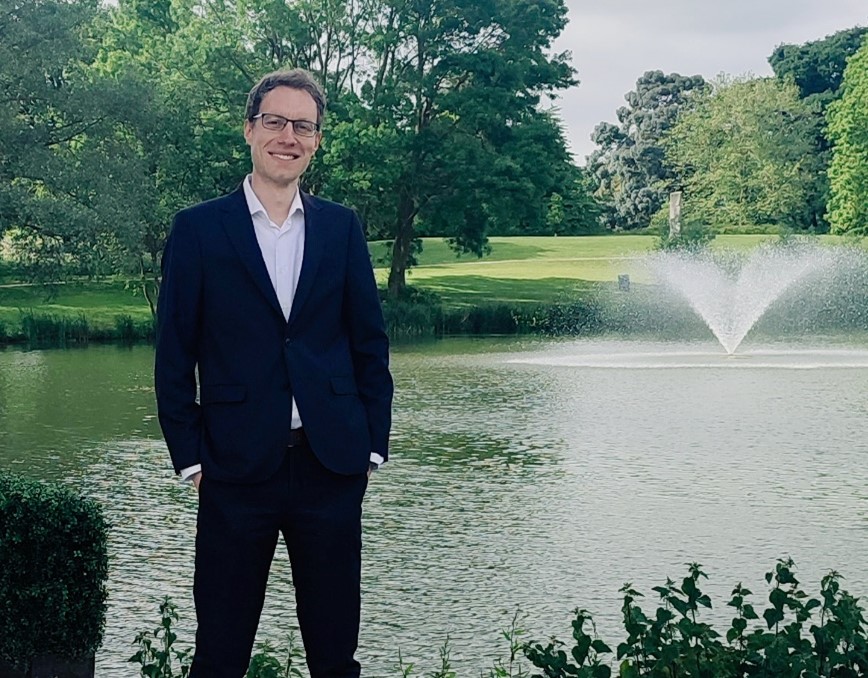 With co-authors from Lyon and Chapman, I finished an experimental study on the effects of algorithmic trading. In financial markets where human and algo traders compete, we find that some trading algorithms help humans trade better. However, other more aggressive trading algorithms exploit human traders and leave them worse off, while the algorithms make large profits. I presented these findings over the last months with audiences in France, Germany, and Spain.
With co-authors from Lyon and Chapman, I finished an experimental study on the effects of algorithmic trading. In financial markets where human and algo traders compete, we find that some trading algorithms help humans trade better. However, other more aggressive trading algorithms exploit human traders and leave them worse off, while the algorithms make large profits. I presented these findings over the last months with audiences in France, Germany, and Spain.
My study on how to avoid wasteful year-end spending in organizations is in a very advanced stage in the journal review process, and I hope it will be published soon.
Finally, I published two studies on green investments. The first study is on why investors choose green investments. The second study is on whether emphasizing the environmental benefits of an investment increases interest in that investment.
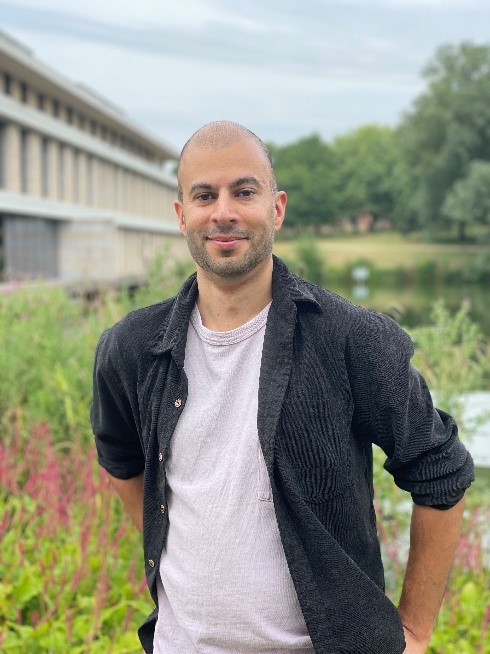 This year saw the launch of my MSc course in Data Science for Economists: an introductory course in Machine Learning (ML) covering the theory underlying key ML algorithms (trees, random Forests, boosted forests, Neural Networks) ,practical coding examples in R and some applications to Economics and Finance. It was great to see the students get to grips with the material so impressively, particularly given it was the first run of the course. They also engaged enthusiastically during a guest lecture from an industry expert: Dr David Bholat who has headed data science teams at Barclays and the Bank of England, and is a Visiting Fellow at our department.
This year saw the launch of my MSc course in Data Science for Economists: an introductory course in Machine Learning (ML) covering the theory underlying key ML algorithms (trees, random Forests, boosted forests, Neural Networks) ,practical coding examples in R and some applications to Economics and Finance. It was great to see the students get to grips with the material so impressively, particularly given it was the first run of the course. They also engaged enthusiastically during a guest lecture from an industry expert: Dr David Bholat who has headed data science teams at Barclays and the Bank of England, and is a Visiting Fellow at our department.
I also published ‘Search and Reallocation in the Covid-19 Pandemic: Evidence from the UK’ in Labour Economics together with Carlos Carrillo-Tudela, Camila Comunello, Alex Clymo, Annette Jäckle, and Ludo Visschers. This paper shows workers adjusted their job search behaviour over the Covid-19 pandemic to target sectors and occupations that were faring relatively better, consistent with models of directed rather than random search. I’m continuing to work with these coauthors on projects exploring the flow of workers across sectors, and the importance of wages and skills for these flows. I presented this work recently to the Low Pay Commission, with an application on the minimum wage which we find could help increase worker search effort in general and particularly effort towards some of the low paying sectors recently reporting labour shortages (like ‘Accommodation and Food’). We continue to engage policy makers across Whitehall and the Bank of England.
 I have been working together with co-authors from Essex and other institutions on a variety of projects that seek to understand how investor behaviour is changed by recent innovations in Fintech. This work is supported by an ESRC grant and aims to highlight potential advantages and pitfalls of these new technologies for consumers. For instance, we have found in a large online experiment that automated advice given by an algorithm (so-called robo-advice) leads to better financial decisions but may not necessarily lead to increased participation in financial markets, as advocated by its proponents. Further, copy trading platforms – these are social networks similar to Facebook with the option to monitor and copy other participants- may lead to excessive risk taking. In a related strand of work we seek to understand how the interconnected structure of decentralized finance platforms may lead to contagion. The resulting paper was just accepted at the proceedings of the ACM DeFi workshop in Copenhagen. We anticipate findings from this research agenda will help policy makers to gauge their optimal approach towards new innovations in Fintech.
I have been working together with co-authors from Essex and other institutions on a variety of projects that seek to understand how investor behaviour is changed by recent innovations in Fintech. This work is supported by an ESRC grant and aims to highlight potential advantages and pitfalls of these new technologies for consumers. For instance, we have found in a large online experiment that automated advice given by an algorithm (so-called robo-advice) leads to better financial decisions but may not necessarily lead to increased participation in financial markets, as advocated by its proponents. Further, copy trading platforms – these are social networks similar to Facebook with the option to monitor and copy other participants- may lead to excessive risk taking. In a related strand of work we seek to understand how the interconnected structure of decentralized finance platforms may lead to contagion. The resulting paper was just accepted at the proceedings of the ACM DeFi workshop in Copenhagen. We anticipate findings from this research agenda will help policy makers to gauge their optimal approach towards new innovations in Fintech.
In a different line of research my co-authors and I seek to understand under which circumstances punishment may stabilize cooperation in societies. One paper studying the emergence of specialized third-party enforcement has just been published in PNAS and another studying the efficacy of collective punishment institutions is forthcoming at Political Science Research and Methods.
Our research students
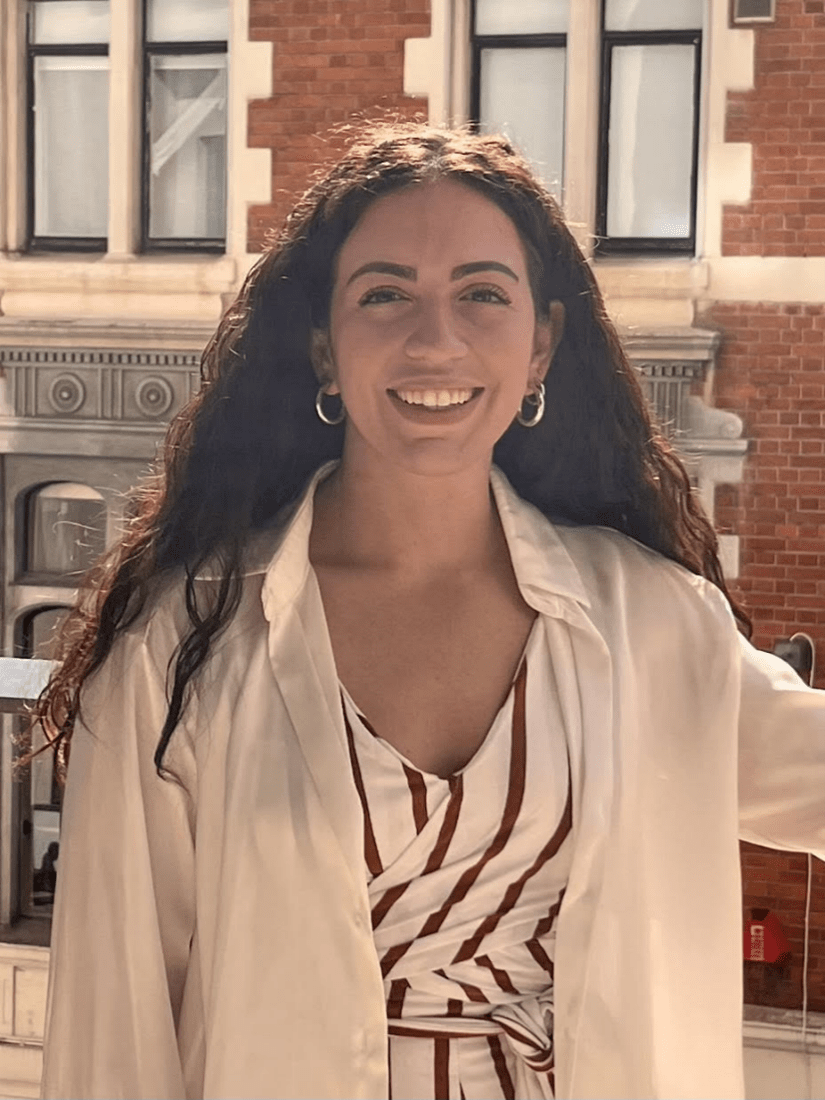 Elena Faieta is a first-year PhD student working on issues at the intersection of labour, regional and environmental economics. She is currently focused on the study of local multipliers and agglomeration spillovers for agro-food and manufacturing industries in rural labour markets. She is also interested in studying the extent to which renewables and green jobs affect the economic growth in remote areas. Elena works under the supervision of Michel Serafinelli and her PhD is funded by the South East Network for Social Sciences (SeNSS).
Elena Faieta is a first-year PhD student working on issues at the intersection of labour, regional and environmental economics. She is currently focused on the study of local multipliers and agglomeration spillovers for agro-food and manufacturing industries in rural labour markets. She is also interested in studying the extent to which renewables and green jobs affect the economic growth in remote areas. Elena works under the supervision of Michel Serafinelli and her PhD is funded by the South East Network for Social Sciences (SeNSS).
 I am working on the macro-labour intersection and presented the first chapter of my PhD thesis (supervised by Professor Carrillo-Tudela and Dr Zentler-Munro), ‘The Impact of Job Satisfaction on Job-to-Job Transitions', at the RSS seminar. This investigates the importance of non-wage amenities in explaining variation in both job satisfaction and job search behaviour. I found that job satisfaction is not only explained by wages and working hours, but also by many other non-wage factors, in particular job security. Moreover, job satisfaction is not simply an idiosyncratic evaluation, but rather is an important variable in determining the probability of starting or stopping a job search and in the probability of changing jobs. I also use job satisfaction to investigate the finding that a third of all job-to-job transitions in the UK take lower pay than their previous job. I was awarded a PhD scholarship from the IMF and this summer I attended the orientation for the scholarship in Washington DC. I was also awarded a SeNSS DTP studentship and attended a Barcelona summer school on labour economics.
I am working on the macro-labour intersection and presented the first chapter of my PhD thesis (supervised by Professor Carrillo-Tudela and Dr Zentler-Munro), ‘The Impact of Job Satisfaction on Job-to-Job Transitions', at the RSS seminar. This investigates the importance of non-wage amenities in explaining variation in both job satisfaction and job search behaviour. I found that job satisfaction is not only explained by wages and working hours, but also by many other non-wage factors, in particular job security. Moreover, job satisfaction is not simply an idiosyncratic evaluation, but rather is an important variable in determining the probability of starting or stopping a job search and in the probability of changing jobs. I also use job satisfaction to investigate the finding that a third of all job-to-job transitions in the UK take lower pay than their previous job. I was awarded a PhD scholarship from the IMF and this summer I attended the orientation for the scholarship in Washington DC. I was also awarded a SeNSS DTP studentship and attended a Barcelona summer school on labour economics.
 Aitor recently submitted his thesis, which studies labour market responses to large structural changes --- such as the rise of industrial robots, increasing trade from China, and changes in labor demand for different occupations (supervised by Professor Marco Francesconi and Dr Nicholas Reynolds). One of the chapters, joint work with Peter Levell (IFS) and Matthias Parey (University of Surrey), uses large-scale panel data from linked decadal censuses in England and Wales to study the responses of individuals and their partners to rising Chinese import competition in the 2000s. Aitor has presented the paper at the RES Annual Meeting in Glasgow, the EEA conference in Barcelona, the Spring Meeting of Young Economists in Turin, and the European Study Trade Group in Surrey. The last chapter of his thesis, joint work with Michael J. Bohm (TU Dortmund) and Ben Etheridge (University of Essex), proposes a measure of occupation-specific labour supply elasticities, capturing the impact on employment of changes in the wage structure across occupations. The paper was recently presented at the EALE conference in Prague. As part of this project, Aitor had a short research visiting period in June-July at the Economics Department of TU Dortmund, hosted by his co-author Bohm.
Aitor recently submitted his thesis, which studies labour market responses to large structural changes --- such as the rise of industrial robots, increasing trade from China, and changes in labor demand for different occupations (supervised by Professor Marco Francesconi and Dr Nicholas Reynolds). One of the chapters, joint work with Peter Levell (IFS) and Matthias Parey (University of Surrey), uses large-scale panel data from linked decadal censuses in England and Wales to study the responses of individuals and their partners to rising Chinese import competition in the 2000s. Aitor has presented the paper at the RES Annual Meeting in Glasgow, the EEA conference in Barcelona, the Spring Meeting of Young Economists in Turin, and the European Study Trade Group in Surrey. The last chapter of his thesis, joint work with Michael J. Bohm (TU Dortmund) and Ben Etheridge (University of Essex), proposes a measure of occupation-specific labour supply elasticities, capturing the impact on employment of changes in the wage structure across occupations. The paper was recently presented at the EALE conference in Prague. As part of this project, Aitor had a short research visiting period in June-July at the Economics Department of TU Dortmund, hosted by his co-author Bohm.
Networks, conferences and workshops
Essex PhD Conference in Applied Economics
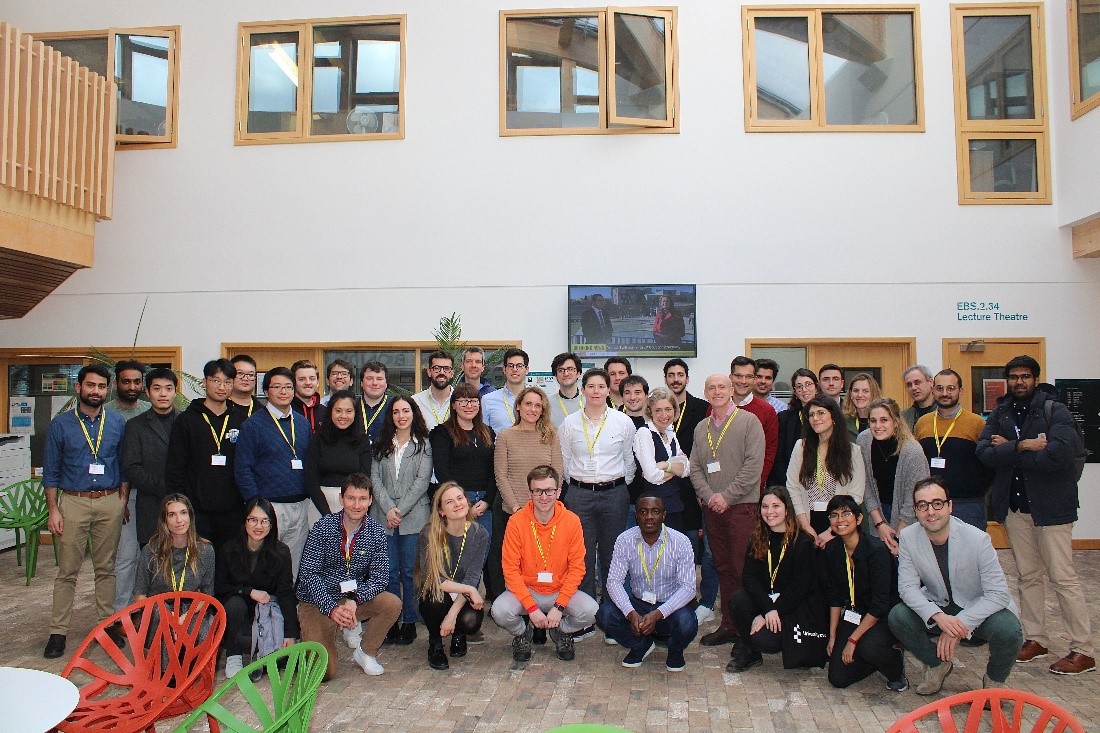 The Department of Economics and ISER jointly organised the very first edition of the Essex PhD Conference in Applied Economics in March 2023 at the Essex Business School. The conference was funded by the Department of Economics at Essex, the Centre for Micro-social Change (MiSoc) and the Royal Economic Society, and supported by an organising committee of seven PhD students at different stages of their studies in either the Department of Economics or at ISER – Aitor Irastorza-Fadrique, Annalivia Polselli, Bin Yu, Dipanwita Ghatak, Hettie Burn, Qingchao Zeng and Natasha Brooks.
The Department of Economics and ISER jointly organised the very first edition of the Essex PhD Conference in Applied Economics in March 2023 at the Essex Business School. The conference was funded by the Department of Economics at Essex, the Centre for Micro-social Change (MiSoc) and the Royal Economic Society, and supported by an organising committee of seven PhD students at different stages of their studies in either the Department of Economics or at ISER – Aitor Irastorza-Fadrique, Annalivia Polselli, Bin Yu, Dipanwita Ghatak, Hettie Burn, Qingchao Zeng and Natasha Brooks.
The call for papers received a resounding response, especially from PhD students in UK and Europe, and a scientific committee of faculty members from the Department of Economics (Aseem Patel, Elif Kubilay, Emma Duchini, and Nicholas Reynolds, coordinated by Michel Serafinelli) volunteered their time to review the applications.
The final programme comprised of 11 full presentations and nine ‘flash’ presentations over two days, all in-person. Session topics ranged from crime and political economy to development, public finance and labour. The keynote speakers were Professor Oriana Bandiera from the London School of Economics, who delivered an insightful talk with advice for PhD students on navigating presentations, publications and research life, and Professor Marco Francesconi from the University of Essex, who spoke about his recent research on measuring wealth inequality in the top 1%. Overall, the event received a lot of positive feedback from participants and attendees, providing encouragement for a second edition of the conference.


 In the past academic year, my paper
In the past academic year, my paper  I am excited to have joined the University of Essex this summer following the completion of my PhD at the London School of Economics. My paper ‘Smart Contracts and the Coase Conjecture’, co-authored with Alkis Georgiadis-Harris and Balázs Szentes, was recently published in the American Economic Review. The paper revisits the classic problem of the sale of a durable good by a monopolist who cannot make intertemporal commitments. The famous Coase conjecture stipulates that, when opportunities to revise her price are frequent, the seller must abandon her monopoly power and clear the market quickly, at a price close to the lowest willingness-to-pay. Motivated by smart contracts used in digital markets, our analysis explores whether this conclusion is robust to allowing the seller to use more complex selling mechanisms. The main result of the paper demonstrates that, with a sufficiently rich contract space, the seller's largest equilibrium profits can be bounded away from the lowest willingness-to-pay, enabling the monopolist to extract rent despite her inability to commit to long-term contracts.
I am excited to have joined the University of Essex this summer following the completion of my PhD at the London School of Economics. My paper ‘Smart Contracts and the Coase Conjecture’, co-authored with Alkis Georgiadis-Harris and Balázs Szentes, was recently published in the American Economic Review. The paper revisits the classic problem of the sale of a durable good by a monopolist who cannot make intertemporal commitments. The famous Coase conjecture stipulates that, when opportunities to revise her price are frequent, the seller must abandon her monopoly power and clear the market quickly, at a price close to the lowest willingness-to-pay. Motivated by smart contracts used in digital markets, our analysis explores whether this conclusion is robust to allowing the seller to use more complex selling mechanisms. The main result of the paper demonstrates that, with a sufficiently rich contract space, the seller's largest equilibrium profits can be bounded away from the lowest willingness-to-pay, enabling the monopolist to extract rent despite her inability to commit to long-term contracts. Professor Carlos Carrillo-Tudela has published three new journal articles in Econometrica, Journal of the European Economics Association and Labour Economics. His current work on “Sectoral Labour Flows” has generated a large impact among policymakers. This work has been used as evidence for the Low Pay Commission Report 2022, the House of Lords Economic Affairs Committee’s inquiry into the UK Labour Supply in February 2023, the Structural Economic Division of the Bank of England’s report to the Monetary Policy Committee in August 2023 and included in the Low Pay Commission Research Symposium, September 2023, that provides recommendations to government ministers for determining the new minimum wage levels.
Professor Carlos Carrillo-Tudela has published three new journal articles in Econometrica, Journal of the European Economics Association and Labour Economics. His current work on “Sectoral Labour Flows” has generated a large impact among policymakers. This work has been used as evidence for the Low Pay Commission Report 2022, the House of Lords Economic Affairs Committee’s inquiry into the UK Labour Supply in February 2023, the Structural Economic Division of the Bank of England’s report to the Monetary Policy Committee in August 2023 and included in the Low Pay Commission Research Symposium, September 2023, that provides recommendations to government ministers for determining the new minimum wage levels. With co-authors from Yale, KCL, and Amsterdam, I finished
With co-authors from Yale, KCL, and Amsterdam, I finished  This past academic year, I gave talks on the design of on-line markets at Airbnb headquarters and in a webinar organized by Dongbei University in northern China. I also gave a webinar for the Learning, Evolution & Games group on self-enforcing cycles in large games, and published a coauthored paper in Management Science on the inclusion premium for stocks that become part of an index fund.
This past academic year, I gave talks on the design of on-line markets at Airbnb headquarters and in a webinar organized by Dongbei University in northern China. I also gave a webinar for the Learning, Evolution & Games group on self-enforcing cycles in large games, and published a coauthored paper in Management Science on the inclusion premium for stocks that become part of an index fund. I have a had a busy year of research with some new publications and interesting conferences, workshops and invited seminars. I recently published articles in Econometrica and Econometric Theory as well as a personal favourite: a project testing urban economics models with archaeological data from ancient Greece that appeared in the Journal of Urban Economics. All these articles involved international collaborations as wide from South Korea, China and the US. I have also started a number of new projects that I am very excited about, again with co-authors across the globe. Over the last year I also had the privilege of travelling to Lima for the Latin American Econometric Society meeting, which was a superb scientific event with the added bonus of some of the world’s best gastronomical offerings in the Peruvian capital. I also presented my research at conferences and seminars in the US, France, Romania and Denmark.
I have a had a busy year of research with some new publications and interesting conferences, workshops and invited seminars. I recently published articles in Econometrica and Econometric Theory as well as a personal favourite: a project testing urban economics models with archaeological data from ancient Greece that appeared in the Journal of Urban Economics. All these articles involved international collaborations as wide from South Korea, China and the US. I have also started a number of new projects that I am very excited about, again with co-authors across the globe. Over the last year I also had the privilege of travelling to Lima for the Latin American Econometric Society meeting, which was a superb scientific event with the added bonus of some of the world’s best gastronomical offerings in the Peruvian capital. I also presented my research at conferences and seminars in the US, France, Romania and Denmark. Tim Hatton has been working on emigration from the UK to the United States, Canada and Australia in the late nineteenth century. Much has been written about the economic gains to the migrants but less about the cost of the journey. One important element of the cost is foregone earnings while on the voyage. By combining data on dates of departure and arrival, Tim has provided new measures of the length of emigrant voyages. They show that voyages from Liverpool to New York fell from 40 days in the early 1850s to 8 days in 1913, largely due to the transition from sailing ships to steamships. Over the same six decades the voyage to Australia fell from 105 to 46 days. Tim finds that voyage durations influenced the flow of migration and is now studying the policies of assisted migration that were designed to encourage migrants to go to Australia.
Tim Hatton has been working on emigration from the UK to the United States, Canada and Australia in the late nineteenth century. Much has been written about the economic gains to the migrants but less about the cost of the journey. One important element of the cost is foregone earnings while on the voyage. By combining data on dates of departure and arrival, Tim has provided new measures of the length of emigrant voyages. They show that voyages from Liverpool to New York fell from 40 days in the early 1850s to 8 days in 1913, largely due to the transition from sailing ships to steamships. Over the same six decades the voyage to Australia fell from 105 to 46 days. Tim finds that voyage durations influenced the flow of migration and is now studying the policies of assisted migration that were designed to encourage migrants to go to Australia. The expansion of digital financial services has been beneficial for people but it has also given rise to consumer protection issues such as fraud and scams. Detrimental effects of scams include not only monetary costs but also non-monetary costs such as erosion of trust in financial services. This raises the following question: how good are people at recognising scams? Elif Kubilay and Lisa Spantig answer this question in their recently published paper at the Journal of Development Economics (joint with Jana Cahlikova, Lucy Kaaria and Eva Raiber). Specifically, they conducted an online experiment in Kenya using real scam messages. Additionally, they tested the effectiveness of scam education, a common approach used by banks and financial institutions. The results show that scam education does not improve scam identification ability. A closer look into the results reveal that participants who receive scam education are more likely to mistake official messages as scam in comparison to the participants in the control group, suggesting over-caution.
The expansion of digital financial services has been beneficial for people but it has also given rise to consumer protection issues such as fraud and scams. Detrimental effects of scams include not only monetary costs but also non-monetary costs such as erosion of trust in financial services. This raises the following question: how good are people at recognising scams? Elif Kubilay and Lisa Spantig answer this question in their recently published paper at the Journal of Development Economics (joint with Jana Cahlikova, Lucy Kaaria and Eva Raiber). Specifically, they conducted an online experiment in Kenya using real scam messages. Additionally, they tested the effectiveness of scam education, a common approach used by banks and financial institutions. The results show that scam education does not improve scam identification ability. A closer look into the results reveal that participants who receive scam education are more likely to mistake official messages as scam in comparison to the participants in the control group, suggesting over-caution.  Sheri Markose
Sheri Markose Heading an interdisciplinary team of economists, psychologists and musicians, I published a paper demonstrating
Heading an interdisciplinary team of economists, psychologists and musicians, I published a paper demonstrating  Nick recently had a paper conditionally accepted at the Journal of Human Resources. It presents evidence that recent increases in the mortality of white Americans has roots in their health as children in the 1950s and 1960s.
Nick recently had a paper conditionally accepted at the Journal of Human Resources. It presents evidence that recent increases in the mortality of white Americans has roots in their health as children in the 1950s and 1960s. Kate has participated in several interdisciplinary initiatives this year. She has worked with Law School colleagues to submit a large research grant, spanning all three Essex faculties, on fairness in competition and consumer interactions. She worked with the Institute of Social and Economic Research and the Law School to support the evolution of energy policy in the UK via a series of meetings and workshops with OFGEM and the Department of Energy and Net Zero. Kate also submitted a bid joint with the Indian Institute of Technology and a private intellectual property consultancy to judge the effectiveness of AI in patent valuation. Kate’s two PhD students, Angelos Stenimachitis and Emmanuel Offei, continue their work on the demand for Intellectual Property Protection, joint with the UK Intellectual Property Office and the Essex Business School (Stenimachitis), and the demand for food waste platform services, joint with the Kedge Business School in France (Offei).
Kate has participated in several interdisciplinary initiatives this year. She has worked with Law School colleagues to submit a large research grant, spanning all three Essex faculties, on fairness in competition and consumer interactions. She worked with the Institute of Social and Economic Research and the Law School to support the evolution of energy policy in the UK via a series of meetings and workshops with OFGEM and the Department of Energy and Net Zero. Kate also submitted a bid joint with the Indian Institute of Technology and a private intellectual property consultancy to judge the effectiveness of AI in patent valuation. Kate’s two PhD students, Angelos Stenimachitis and Emmanuel Offei, continue their work on the demand for Intellectual Property Protection, joint with the UK Intellectual Property Office and the Essex Business School (Stenimachitis), and the demand for food waste platform services, joint with the Kedge Business School in France (Offei). This past academic year, my paper titled
This past academic year, my paper titled  Michel is working on two projects at the intersection of Labour, Regional and Environmental Economics. The first one, on
Michel is working on two projects at the intersection of Labour, Regional and Environmental Economics. The first one, on  With co-authors from Lyon and Chapman, I finished an
With co-authors from Lyon and Chapman, I finished an  This year saw the launch of my MSc course in Data Science for Economists: an introductory course in Machine Learning (ML) covering the theory underlying key ML algorithms (trees, random Forests, boosted forests, Neural Networks) ,practical coding examples in R and some applications to Economics and Finance. It was great to see the students get to grips with the material so impressively, particularly given it was the first run of the course. They also engaged enthusiastically during a guest lecture from an industry expert: Dr David Bholat who has headed data science teams at Barclays and the Bank of England, and is a Visiting Fellow at our department.
This year saw the launch of my MSc course in Data Science for Economists: an introductory course in Machine Learning (ML) covering the theory underlying key ML algorithms (trees, random Forests, boosted forests, Neural Networks) ,practical coding examples in R and some applications to Economics and Finance. It was great to see the students get to grips with the material so impressively, particularly given it was the first run of the course. They also engaged enthusiastically during a guest lecture from an industry expert: Dr David Bholat who has headed data science teams at Barclays and the Bank of England, and is a Visiting Fellow at our department. I have been working together with co-authors from Essex and other institutions on a variety of projects that seek to understand how investor behaviour is changed by recent innovations in Fintech. This work is supported by an ESRC grant and aims to highlight potential advantages and pitfalls of these new technologies for consumers. For instance, we have found in a large online experiment that automated advice given by an algorithm (so-called robo-advice) leads to better financial decisions but may not necessarily lead to increased participation in financial markets, as advocated by its proponents. Further, copy trading platforms – these are social networks similar to Facebook with the option to monitor and copy other participants- may lead to excessive risk taking. In a related strand of work we seek to understand how the interconnected structure of decentralized finance platforms may lead to contagion. The resulting paper was just accepted at the proceedings of the ACM DeFi workshop in Copenhagen. We anticipate findings from this research agenda will help policy makers to gauge their optimal approach towards new innovations in Fintech.
I have been working together with co-authors from Essex and other institutions on a variety of projects that seek to understand how investor behaviour is changed by recent innovations in Fintech. This work is supported by an ESRC grant and aims to highlight potential advantages and pitfalls of these new technologies for consumers. For instance, we have found in a large online experiment that automated advice given by an algorithm (so-called robo-advice) leads to better financial decisions but may not necessarily lead to increased participation in financial markets, as advocated by its proponents. Further, copy trading platforms – these are social networks similar to Facebook with the option to monitor and copy other participants- may lead to excessive risk taking. In a related strand of work we seek to understand how the interconnected structure of decentralized finance platforms may lead to contagion. The resulting paper was just accepted at the proceedings of the ACM DeFi workshop in Copenhagen. We anticipate findings from this research agenda will help policy makers to gauge their optimal approach towards new innovations in Fintech. Elena Faieta is a first-year PhD student working on issues at the intersection of labour, regional and environmental economics. She is currently focused on the study of local multipliers and agglomeration spillovers for agro-food and manufacturing industries in rural labour markets. She is also interested in studying the extent to which renewables and green jobs affect the economic growth in remote areas. Elena works under the supervision of Michel Serafinelli and her PhD is funded by the
Elena Faieta is a first-year PhD student working on issues at the intersection of labour, regional and environmental economics. She is currently focused on the study of local multipliers and agglomeration spillovers for agro-food and manufacturing industries in rural labour markets. She is also interested in studying the extent to which renewables and green jobs affect the economic growth in remote areas. Elena works under the supervision of Michel Serafinelli and her PhD is funded by the  I am working on the macro-labour intersection and presented the first chapter of my PhD thesis (supervised by Professor Carrillo-Tudela and Dr Zentler-Munro), ‘The Impact of Job Satisfaction on Job-to-Job Transitions', at the RSS seminar. This investigates the importance of non-wage amenities in explaining variation in both job satisfaction and job search behaviour. I found that job satisfaction is not only explained by wages and working hours, but also by many other non-wage factors, in particular job security. Moreover, job satisfaction is not simply an idiosyncratic evaluation, but rather is an important variable in determining the probability of starting or stopping a job search and in the probability of changing jobs. I also use job satisfaction to investigate the finding that a third of all job-to-job transitions in the UK take lower pay than their previous job. I was awarded a PhD scholarship from the IMF and this summer I attended the orientation for the scholarship in Washington DC. I was also awarded a SeNSS DTP studentship and attended a Barcelona summer school on labour economics.
I am working on the macro-labour intersection and presented the first chapter of my PhD thesis (supervised by Professor Carrillo-Tudela and Dr Zentler-Munro), ‘The Impact of Job Satisfaction on Job-to-Job Transitions', at the RSS seminar. This investigates the importance of non-wage amenities in explaining variation in both job satisfaction and job search behaviour. I found that job satisfaction is not only explained by wages and working hours, but also by many other non-wage factors, in particular job security. Moreover, job satisfaction is not simply an idiosyncratic evaluation, but rather is an important variable in determining the probability of starting or stopping a job search and in the probability of changing jobs. I also use job satisfaction to investigate the finding that a third of all job-to-job transitions in the UK take lower pay than their previous job. I was awarded a PhD scholarship from the IMF and this summer I attended the orientation for the scholarship in Washington DC. I was also awarded a SeNSS DTP studentship and attended a Barcelona summer school on labour economics. Aitor recently submitted his thesis, which studies labour market responses to large structural changes --- such as the rise of industrial robots, increasing trade from China, and changes in labor demand for different occupations (supervised by Professor Marco Francesconi and Dr Nicholas Reynolds). One of the chapters, joint work with Peter Levell (IFS) and Matthias Parey (University of Surrey), uses large-scale panel data from linked decadal censuses in England and Wales to study the responses of individuals and their partners to rising Chinese import competition in the 2000s. Aitor has presented the paper at the RES Annual Meeting in Glasgow, the EEA conference in Barcelona, the Spring Meeting of Young Economists in Turin, and the European Study Trade Group in Surrey. The last chapter of his thesis, joint work with Michael J. Bohm (TU Dortmund) and Ben Etheridge (University of Essex), proposes a measure of occupation-specific labour supply elasticities, capturing the impact on employment of changes in the wage structure across occupations. The paper was recently presented at the EALE conference in Prague. As part of this project, Aitor had a short research visiting period in June-July at the Economics Department of TU Dortmund, hosted by his co-author Bohm.
Aitor recently submitted his thesis, which studies labour market responses to large structural changes --- such as the rise of industrial robots, increasing trade from China, and changes in labor demand for different occupations (supervised by Professor Marco Francesconi and Dr Nicholas Reynolds). One of the chapters, joint work with Peter Levell (IFS) and Matthias Parey (University of Surrey), uses large-scale panel data from linked decadal censuses in England and Wales to study the responses of individuals and their partners to rising Chinese import competition in the 2000s. Aitor has presented the paper at the RES Annual Meeting in Glasgow, the EEA conference in Barcelona, the Spring Meeting of Young Economists in Turin, and the European Study Trade Group in Surrey. The last chapter of his thesis, joint work with Michael J. Bohm (TU Dortmund) and Ben Etheridge (University of Essex), proposes a measure of occupation-specific labour supply elasticities, capturing the impact on employment of changes in the wage structure across occupations. The paper was recently presented at the EALE conference in Prague. As part of this project, Aitor had a short research visiting period in June-July at the Economics Department of TU Dortmund, hosted by his co-author Bohm. The Department of Economics and ISER jointly organised the very first edition of the Essex PhD Conference in Applied Economics in March 2023 at the Essex Business School. The conference was funded by the Department of Economics at Essex, the Centre for Micro-social Change (MiSoc) and the Royal Economic Society, and supported by an organising committee of seven PhD students at different stages of their studies in either the Department of Economics or at ISER – Aitor Irastorza-Fadrique, Annalivia Polselli, Bin Yu, Dipanwita Ghatak, Hettie Burn, Qingchao Zeng and Natasha Brooks.
The Department of Economics and ISER jointly organised the very first edition of the Essex PhD Conference in Applied Economics in March 2023 at the Essex Business School. The conference was funded by the Department of Economics at Essex, the Centre for Micro-social Change (MiSoc) and the Royal Economic Society, and supported by an organising committee of seven PhD students at different stages of their studies in either the Department of Economics or at ISER – Aitor Irastorza-Fadrique, Annalivia Polselli, Bin Yu, Dipanwita Ghatak, Hettie Burn, Qingchao Zeng and Natasha Brooks. 